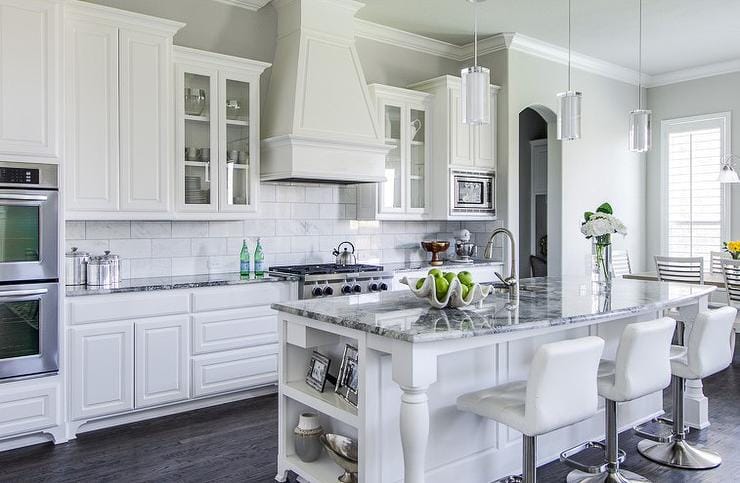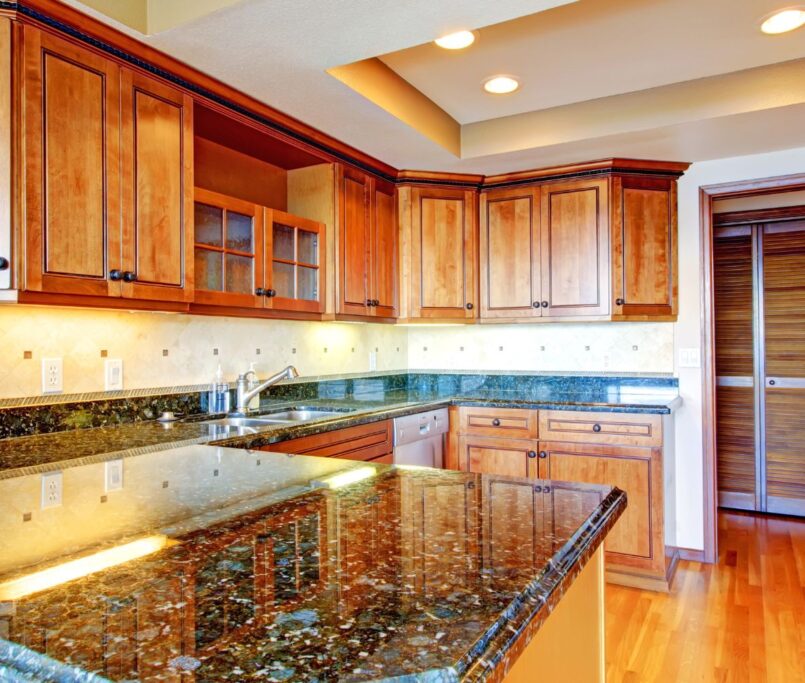The Pros and Cons of Granite Countertops – All You Need to Know (Updated 2019)
Search online for the latest trends of kitchen interior designing, and you’ll notice a 9 out of 10 of them, including a natural stone countertop. There are tons of different stunning looking natural stones countertops out there. Marble, granite, quartz, gauged porcelain, onyx… etc.
Here’s a sneak peak on one of the latest countertop trends in 2018. A honed or matte finish surface is here to stay!
It has always looked classy and sophisticated, and if you ask me. A honed granite countertop will definitely win the competition (despite them being a little harder to maintain than those that are polished).
Starting out as a glamorous but expensive countertop choice sometime in 1987, the advent of globalization (and the cheap labor it brought with it), improved logistics, diamond saws and computerized manufacturing has made granite so much cheaper that it’s now a common sight in ordinary households.
Granite countertops are synonymous with quality, beauty, and durability. However, it’s not perfect, and it’s important to understand the pros and cons of granite countertops before getting one.
[Check out Pros and Cons of Quartz Countertops Here]
Pros of Granite Countertops
Hard and Durable
Rock solid, granite is a hard material and is therefore very resistant to scratching and cuts. In fact, it’s so hard that cutting directly on its surface with steel knives is a bad idea because it will leave your knives dull and damaged!
It’s crazy how hard granite is. It scores a 7 on Moh’s hardness scale while Topaz scores an 8. Only a very few numbers of natural minerals left is able to cut or scratch it.
Granite countertops are also highly resistant to heat, and hot pots and pans will not damage its surface (granite has a melting point of 1210 – 1260 degrees Celsius; a hot pan is about 177 – 232 degrees Celsius). So, even if you take a hot pan right out of the oven and put it on the granite countertop, it’ll still work perfectly without getting damaged.
Aesthetics
In another word, its BEAUTY…
It’s one of the marvel creations of mother nature. They come in many shades and they all look stunning and aesthetically pleasing.
That’s the reason why people are willing to pay top-dollar to have a heavy slab of stone cut out from the earth, shaped and processed with specialized equipment, then shipped long distances – granite countertops are highly regarded for their beauty.
Some like it shiny and polished, others prefer it honed and natural looking. A few others appreciate the uniqueness that each slab is.
Either it’s a pearl white minimalistic modern ambiance or a coal black classy ambiance you’re looking for, the nature has prepared just the right granite for you. If you’re an interior designing freak, you’ll definitely understand why almost all designers are saying granite are their favourtie countertops.
Highly resistant to… almost everything
Assuming it contains negligible amounts of calcium, granite countertops will not react with acids. In contrast to marble, which will fizzle and get visibly etched when it comes into contact with acid, you don’t have to worry that mild acids like those found in foods doing a number on your favorite granite countertop.
Although granite is born naturally porous while the mother nature creates it. It can be sealed to resist all stains and liquids. With a gentle wipe with a damp cloth, there goes all the stain your kids left you at the dining table. No more ketchup mess after the dinner.
The sunlight – that wears the surface of almost everything. From our favourite white tee, to the walls of our house. Good news is – granite countertop is sunlight-resistant.
So, can you use it outdoor?
You might ask.
The answer is, YES!
Rain or shine. It always stands gracefully and beautifully even outdoors.
Hygienic and clean
Another upside of stain-resistant? No more festering algae and even bacteria. But, it’s not the case before a vital process called – sealing. Which means coating the stone with a protective layer to prevent scratch, retained water, stained and bacteria to fester.
Kids and baby proof? Check.
After sealing, its non-porous property eliminates the habitat for tiny bacteria and algae to grow. You’ll be amazed how many people are getting food poisoned due to unclean kitchen. So, keep it spic and span for your family.
Want to know how to maintain your countertop? Chick Here
[vc_btn title=”GET INSTANT QUOTE TODAY” color=”warning” size=”lg” align=”center” css_animation=”bounceIn” link=”url:https%3A%2F%2Fwww.stoneamperor.com.sg/instant-countertop-quote||target:%20_blank|” css=”.vc_custom_1526456146325{padding-top: 20px !important;}”]
Cons of Granite Countertops
Brittle
“Every good thing in life always followed by an equally bad one.”
True story.
One of greatest granite’s strengths is also its deadly weakness. Rigid and brittle, hard impacts and pressures can chip and crack it. Dropping your new oven on it might just do the job, sending off a corner of the slab. It doesn’t happen every day, but it will under the right circumstances.
Even if it’s repairable, the structural integrity of the stone cannot be fully restored, and a severely cracked piece will have to be replaced entirely. And it’s still not the worst part, just wait until you see the service bill sent to your house.
It’s also risky if you have an amateur granite installer. Badly installed granite countertops with insufficient gap space in between the seams can cause it to crack under the effect of weathering.
Don’t take the risk. We have trained professionals to install your perfect granite countertop in just the way you like it.
Porous
Granite, like most natural stones, is entirely covered in small holes called pores. Generally regarded as the biggest downside to natural stone, these pores if left unsealed allow liquids to seep into the material and leave stains that will be difficult to remove.
More worrying, however, is the potential for these pores to get clogged up with bacteria and pose a health hazard.
Same to the case. If you’re facing a bad installer, you’re even your family’s health at risk. Although we know that we can seal the granite and make it water-resistant and all, but never forget that seals wear over time.
Granite countertop needs a resealing every once a year. If you don’t do it, very soon you’ll start seeing stains you can’t get rid off.
Seams
Granite always comes in a huge size, probably around 3 meters x 1.5 meters. If you’re going for an island, then you don’t need to worry about this. But, if you’re going to customize an L or a U shape countertop, then this will be inevitable.
Expect to notice about a 0.4cm of seams at every joints. Although professional granite installers are able to disguise the seams by mixing custom epoxy to make it inconspicuous, but if you’re looking for them, they’ll be there.
Expensive
Although far cheaper than they were 20 years ago, a granite countertop is still quite expensive. They typically cost 50 percent more than solid surfaces and about 300 percent more than laminates.
And because granite is a hard and heavy material, it is difficult to transport and install, which adds to labor and transportation cost.
It really is an invest. A rather risky one. Because not only the yearly resealing is going to cost you money, the installation fee can already be a fortune to spare.
Plus, the installing process is extremely tricky. It’s easy to damage the granite while installing and that leaves you no option but to replace either the whole stone or a particular slab.
If you like this article, you might also be interested in granite vs marble as a countertop option click Here to read and learn more, if you have any inquiries, feel free to contact us at Stone Amperor
More from the same Pros and Cons series:
- Pros and Cons of Quartz Countertops – All You Need to Know.
- Pros and Cons of Aluminium Kitchen Cabinets – All You Need to Know.
- Granite VS Caesarstone: What’s best for you?
- 8 Pros and Cons of materials used in making the countertop.






